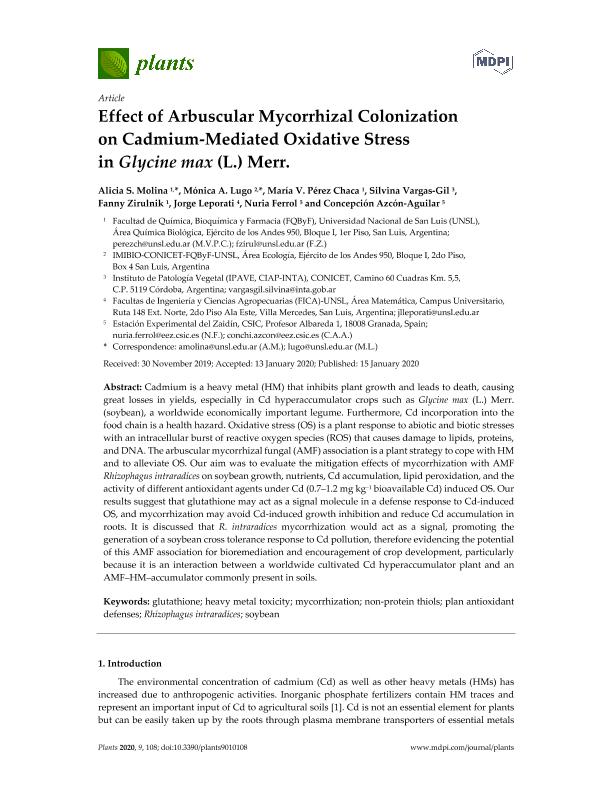Artículo
Effect of Arbuscular Mycorrhizal Colonization on Cadmium‐Mediated Oxidative Stress in Glycine max (L.) Merr.
Molina, Alicia Susana; Lugo, Mónica Alejandra ; Pérez Chaca, María V.; Vargas Gil, Silvina
; Pérez Chaca, María V.; Vargas Gil, Silvina ; Zirulnik, Fanny; Leporati, Jorge Leandro; Ferrol, Nuria; Azcón González de Aguilar, Concepción
; Zirulnik, Fanny; Leporati, Jorge Leandro; Ferrol, Nuria; Azcón González de Aguilar, Concepción
 ; Pérez Chaca, María V.; Vargas Gil, Silvina
; Pérez Chaca, María V.; Vargas Gil, Silvina ; Zirulnik, Fanny; Leporati, Jorge Leandro; Ferrol, Nuria; Azcón González de Aguilar, Concepción
; Zirulnik, Fanny; Leporati, Jorge Leandro; Ferrol, Nuria; Azcón González de Aguilar, Concepción
Fecha de publicación:
01/2020
Editorial:
Molecular Diversity Preservation International
Revista:
Plants
ISSN:
2223-7747
Idioma:
Inglés
Tipo de recurso:
Artículo publicado
Clasificación temática:
Resumen
Cadmium is a heavy metal (HM) that inhibits plant growth and leads to death, causing great losses in yields, especially in Cd hyperaccumulator crops such as Glycine max (L.) Merr. (soybean), a worldwide economically important legume. Furthermore, Cd incorporation into the food chain is a health hazard. Oxidative stress (OS) is a plant response to abiotic and biotic stresses with an intracellular burst of reactive oxygen species (ROS) that causes damage to lipids, proteins, and DNA. The arbuscular mycorrhizal fungal (AMF) association is a plant strategy to cope with HM and to alleviate OS. Our aim was to evaluate the mitigation effects of mycorrhization with AMF Rhizophagus intraradices on soybean growth, nutrients, Cd accumulation, lipid peroxidation, and the activity of different antioxidant agents under Cd (0.7–1.2 mg kg−1 bioavailable Cd) induced OS. Our results suggest that glutathione may act as a signal molecule in a defense response to Cd-induced OS, and mycorrhization may avoid Cd-induced growth inhibition and reduce Cd accumulation in roots. It is discussed that R. intraradices mycorrhization would act as a signal, promoting the generation of a soybean cross tolerance response to Cd pollution, therefore evidencing the potential of this AMF association for bioremediation and encouragement of crop development, particularly because it is an interaction between a worldwide cultivated Cd hyperaccumulator plant and an AMF–HM–accumulator commonly present in soils.
Archivos asociados
Licencia
Identificadores
Colecciones
Articulos(IMIBIO-SL)
Articulos de INST. MULTIDICIPLINARIO DE INV. BIO. DE SAN LUIS
Articulos de INST. MULTIDICIPLINARIO DE INV. BIO. DE SAN LUIS
Citación
Molina, Alicia Susana; Lugo, Mónica Alejandra; Pérez Chaca, María V.; Vargas Gil, Silvina; Zirulnik, Fanny; et al.; Effect of Arbuscular Mycorrhizal Colonization on Cadmium‐Mediated Oxidative Stress in Glycine max (L.) Merr.; Molecular Diversity Preservation International; Plants; 9; 1; 1-2020; 1-17
Compartir
Altmétricas



